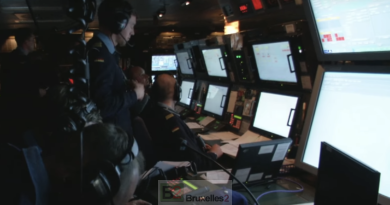The 27 could propose a mechanism for lifting the blockade of Gaza
 (BRUXELLES2) The 27 EU foreign ministers meeting in Luxembourg on Monday could offer their good offices in the Gaza crisis.
(BRUXELLES2) The 27 EU foreign ministers meeting in Luxembourg on Monday could offer their good offices in the Gaza crisis.
The EU wants to accompany the lifting of a blockade which it continues to judge " unacceptable » and which she asks for the lifting. The EU could thus propose, at the same time, an increase in the volume and above all in the type of goods that can enter Gaza, as well as a " supporting mechanism » international border control points to Gaza to verify that goods arriving in the Palestinian territory do indeed comply with the international list and to prevent any arms smuggling.
Reverse blockade logic
The objective - explains a European diplomat - is to "reverse the current blockade logic to a strict control logic", by offering a range of tools to facilitate this development.
However, the 27 will not give the green light to a new PeSDC operation on Monday. We are not there yet. They will give a mandate to Cathy Ashton, the EU's High Representative for Foreign Affairs, to study different options and above all to get the Israelis (and Egyptians) to renew the 2005 agreement. political "push" to put the offer publicly on the table so that it is taken up by the Americans and put pressure on the various partners (Israelis, Egyptians).
A diplomatic firing window
All these proposals are, in fact, subject to one condition: the agreement of the Israelis and the Egyptians to renew the 2005 agreement. Which is not an easy task. The context is favourable. The Israeli government has madea monumental mistake"by launching his commandos on the Gaza flotilla. In a way,"he must pay". But you have to "offer him a way out of the crisis. (...) A kind of give and take".
The international pressure is at the maximum of what it could be. But you have to go fast. On the one hand, before the pressure drops. And that the Europeans go back to other business. On the other hand, before the United States really entered the campaign for the midterm renewal. An EU diplomat thus believes that there is a window of action, on the American side, "until around mid-July".
Nobody speaks of a "give and take" on the international investigation. But the idea is there. The Europeans - even if they officially say the opposite - accept the idea of an Israeli investigation with an international component (an American and a European) as it is currently under discussion; the Israelis agree to relax the blockade on Gaza by accepting an increase in goods and international monitoring.
Land and sea control options
Here are some of the options studied at European level and which will be debated on Monday, possibly accompanied by a small "off record" comment on the feasibility of such a measure.
• Resumption of the EUBAM Rafah control operation at the passenger entry point from Rafah to Gaza. This first solution would be very limited and would not solve the blockade. Because it only concerns "passenger points".
• Extension of European surveillance to the goods entry points of Kernit or even Kerem Shalom. Undoubtedly the most effective solution for lifting the blockade and the fastest to put in place. Because it does not require an upheaval of the systems in place, both on the Israeli side and on the European side. "The small EUBAM team already in place in Israel can finalize the preliminary planning work on site, quickly. Just send a few more experts. And we can startr ".
• Sending a team of international controllers to an Israeli port (Ashdod) to carry out the same work. This is the maritime part of the "European offer".
• Sending a team of monitors to Cyprus where boats bound for Gaza (direct) or via Israel would stop to check that there are no weapons on board. Solution quite complex to implement because it would then require maritime surveillance (or escort) of the boats to a safe port.
At European level, although politically a clear majority of Member States roughly agree on the need to lift the blockade and propose an international facilitator, it remains to be seen how the details will be adjusted, and above all the terms (the Czechs and Dutch are always more reluctant to sanctions on Israel).
(Nicolas Gros-Verheyde)
(photo credit: Israeli forces - Kerem Shalom border post)

